- Home
- Parnell Hall
Clicker Training
Clicker Training Read online
Clicker Training, a short story
Parnell Hall
Copyright © 1999, 2013 by Parnell Hall
Published by Parnell Hall, eBook edition, 2013.
Published by Parnell Hall, 2013.
Originally published by Ballantine Books in Canine Christmas, 1999.
All rights reserved. Written permission must be secured from author/publisher to use or reproduce any part of this work, except brief quotations in critical reviews or articles.
ISBN (Kindle): 978-1-936441-63-1
Table of Contents
Clicker Training
Books by Parnell Hall
“THAT’S A nice poodle.”
“She’s a Portuguese water dog.”
“Whatever. She’s a fine looking animal.”
“Thank you.”
I said it through gritted teeth. I wouldn’t have minded so much if it wasn’t the third or fourth time we’d had the exact same conversation. But either Mr. Abercrombie had a worse memory than mine—hard to imagine—or else he was determined to pretend to forget due to a bizarre sense of humor of the type that was apt to be funny only to him. In either event, I was finding it rather tiresome, particularly since my wife and I had only checked in the night before.
The Stone Inn—the unlikely name of the sprawling, three-story, white, wood-frame house that to the best I could determine did not have a single stone in it—was one of the few bed and breakfasts not booked solidly through Christmas in all southern Vermont, due to the fact there had been three straight weeks of light, dry, powdery snow, resulting in gorgeous, idyllic New England landscapes and the best skiing conditions in twenty years.
My wife and I don’t ski. We were in Vermont because our son Tommie was spending his Christmas vacation in France on a school trip—don’t ask. (In my day a school trip meant going down to the firehouse to see the firemen polish the fire engine.) So for the first time in years our apartment would seem rather empty over the holidays, and we wanted to get out of town.
To be sure, the snow was a lure. We don’t get snow much in New York City these days, what with global warming, and as a New England boy born and bred, I miss it. So we opted for Vermont.
The Stone Inn was not our first choice. In a guide book that gave up to four stars, it got one. Nonetheless, we had chosen it on the basis of two important criteria: it had a vacancy and it took dogs.
Mr. Abercrombie, it occurred to me uncharitably, had probably chosen it because it was cheap.
Abercrombie was a plump man with a bulbous nose, twinkling eyes, rosy cheeks, and a predilection for heavy knit sweaters with reindeer on them. So far he had exhibited only two, still that was enough for me to fantasize dozens more carefully packed in an enormous suitcase.
But I was talking about the dog.
The morning after we had arrived we were all sitting around the spacious living room after a rather feeble breakfast of French toast and coffee, garnished with an occasional grape, served by the stout Austrian man whose stout Austrian wife had prepared the sumptuous repast. The two of them presumably owned the Stone Inn and were responsible for racking up its impressive total of one star. Such as it was, that was breakfast. The Stone Inn was a bed and breakfast, and since we’d slept there and had breakfast, we’d gotten what we’d paid for, and now we had all adjourned to the living room, where Alice and Zelda were holding an impromptu lecture on clicker training.
Alice is my wife.
Zelda is the dog.
“Pure clicker training,” Alice was saying, “is very nice, because basically the dog teaches herself. The dog offers you a behavior, you click the clicker. The dog hears the click, realizes she’s done the right thing. The dog repeats the behavior to hear the click again.”
“Why?” said a young woman with sandy hair and a rather well filled out ski sweater, if aging married men are still allowed to notice such things, sexist notions dying hard. The woman was presumably the wife, girlfriend, or sister of the young man in the green fleece pullover who had blond hair, wore wire-rimmed glasses, and looked too all-American to be true. They were sitting on a love seat in the corner, which made me think they probably weren’t brother and sister, but I’ve been wrong before.
Also in the audience were a middle-aged couple, he bald, she white haired, whom I shuddered to think were probably no older than I; an elderly man with wizened hands, an emaciated face, and an alarming death rattle when he opened his mouth, who damn well better have been older than I; and a man I classified as a sailor, though I hadn’t a clue why, unless it was his large, black beard that I somehow associated with sailing through some elusive, subconscious, psychic connection of which I was not aware.
Alice and I had been introduced to all of these people during breakfast, but I, who retain names like a sieve, could remember only Abercrombie’s, either because he grated on me so or because of the association with Abercrombie and Fitch.
“Why?” Alice said. “Because of the food. We call it clicker training, but it’s really click/treat. You click the clicker and give the dog a treat. The dog quickly comes to associate the click with food.”
Alice plunged ahead, in full lecture mode. “Take a puppy, never been trained before. You want to teach her to sit. So you wait till she does. The puppy sits, you click. And give her a treat. But you don’t feed the puppy where she’s sitting. You hold the treat so she has to get up and get it. Now she’s standing. When she sits again, you click. And treat. It’s amazing how quickly the puppy realizes, If I sit, they’ll click me and I’ll get a treat.”
“Why click at all?” the bearded sailor-type said. He had a cultured voice which, I had to admit, didn’t sound a bit like a sailor. “Why not just give a treat?”
“Because you can’t do it fast enough,” Alice said. “When the dog sits, you feed her. But by the time you reach out and hand her the treat, it’s several seconds after she sat. The dog is smart, but not that smart, to have to think back and say, Oh, they’re feeding me, is that because I just sat? But the click is instantaneous. It pinpoints the action. And promises a treat.”
“Then how come your dog isn’t sitting all the time, trying to get a treat?” the young woman in the sweater said.
“Because you change the game,” Alice said. “After the dog learns the behavior, you add the word sit. Or a hand gesture. Then you only click and treat when the dog does the behavior when you ask her to.”
“So, what can she do?” the bald man said. (The one I was afraid was younger than I.)
“Oh, lots of things,” Alice said. “Though I don’t teach Zelda tricks so much as general obedience.”
The middle-aged woman smiled and said, “Zelda?”
“Yes,” Alice said. “After F. Scott Fitzgerald’s wife.”
I smiled and said nothing. Alice might think that, and we would never disillusion her, but my son Tommie and I both know she was actually named after a Nintendo game.
“Zelda,” Alice called in a high lilting voice.
Zelda, who had been curled up happily in front of the fireplace, raised her head at the sound of Alice’s voice. She certainly looked intelligent, though maybe I’m biased. Zelda is a black dog with white markings on her paws and chest, and long curly hair. Portuguese water dogs don’t shed, they have to be groomed like poodles—though they are not poodles, thank you very much, Mr. Abercrombie—and Zelda was overdue for a haircut, which meant she had a luxurious coat of loose curls and looked positively gorgeous. It also meant you couldn’t see her eyes, but, trust me, the dog was very bright.
Alice stood up, said, “Zelda, come.”
Zelda trotted over to Alice.
Alice said, “Go round.”
Zelda walked around behind Alice’s back.
“
Sit,” Alice said.
Zelda sat at her side.
“Down,” Alice said.
Zelda lay down.
“Stay.”
Alice walked across the room, turned, and faced the dog.
“You haven’t clicked,” the elderly man said. It came out as a wheeze, but confirmed the fact he was still alive.
“Because the sequence isn’t over,” Alice said. “After the dog learns, you chain behaviors. Zelda will follow a whole sequence of commands in order to hear a click. Zelda, come.”
Zelda trotted over to Alice and sat in front of her.
Alice clicked and reached in her pocket for a treat.
“You didn’t ask her to sit,” the young woman pointed out.
“Yes, I did,” Alice said. “I gave her a hand signal.”
“Can you teach her a new behavior?” the young man asked. It was the first time he’d spoken, and he sounded young.
“Sure thing,” Alice said.
Alice looked around the room. In the far corner was a Christmas tree, with strings of lights and colored balls and tinsel. It had presents underneath and a star on top. So far Zelda had given it a wide berth.
“See the Christmas tree?” Alice said. “Zelda’s afraid of it because she’s never seen one. It’s only her second Christmas, and last year she couldn’t go because we went to Stanley’s mother’s, and his mother has cats. So she’s cautious about it, because she’s not entirely sure what it is. From her experience, trees do not grow indoors or have lights.”
“So?” the young man said.
“So, I can use clicker training to teach her something to overcome the fear.”
Alice walked over to the Christmas tree.
“Zelda, come.”
Zelda trotted over.
Alice pointed to a Styrofoam ball hanging from a lower branch. “Touch.”
Zelda looked up at Alice.
Alice pointed again. “Touch.”
Zelda took two steps, reached out, touched the Styrofoam ball with her nose.
Alice clicked. “Good girl,” she said, and gave Zelda a puppy biscuit. As soon as Zelda had eaten it, Alice pointed to the ball and said, “Touch.”
Zelda touched it again, much quicker this time.
Alice clicked, gave her a treat.
This time, when Zelda finished the biscuit, Alice said nothing. She stood there, arms folded.
Zelda looked at her for a moment, then turned, took two steps, reached out, and touched the ball with her nose.
Alice clicked and gave her a treat, while the people in the living room laughed and applauded.
“That’s a smart poodle,” Abercrombie said.
I gnashed my teeth.
Later that morning, we took Zelda out in the snow. She loved it. She ran, she jumped, she rolled. She had a wonderful time. The only thing missing was another dog to play with.
That problem was solved right after lunch. Alice and I got back from the local soup and sandwich shop downtown to find a Labrador retriever had checked in. Of course, the Lab had not checked in by himself—his mommy and daddy were with him. Which is how we dog people refer to the owners of other people’s dogs. And, yes, our own, too. Alice is Zelda’s mommy, and I am Zelda’s daddy. And we know it’s silly, but only to an extent. When Alice says to Zelda, “You wanna go for a walk with daddy?” I hardly even notice.
Anyway, the Lab’s mommy and daddy were a nice young couple, who laughed affectionately as their dog catapulted from the backseat of their Subaru, bounded up to Zelda, and took off with her across the lawn. They whirled and rolled and frolicked and frisked, biting at each other’s ears and tail in a playful friendly way, then raced down the hill over the frozen pond.
I must say, that gave me a turn. But as if he read my mind, my gracious host, Mr. Stone Inn himself, was at my side, grunting away in a thick Austrian accent through which I could barely discern enough words to determine that what he was attempting to assure me was that the pond had been frozen for weeks, and the dogs were in no danger.
Unfortunately, while he was outside calming my fears, Mrs. Stone Inn, his ill-cooking wife, was inside rejecting our new arrivals. Evidently there was no room at the inn—a common Christmas theme—and Zelda and I barely had time to learn the golden Lab’s name was Sandy before he was gone.
Heartbreak.
Do dogs get depressed? In a word, yes. Zelda missed Sandy, not enough not to eat, but enough to mope around the inn and give everyone a good idea where the word hangdog came from.
“Can’t you clicker train her to be happy?” the bald, middle-aged man asked when I ran into him after dinner on my way to take Zelda for a walk.
“That’s the one thing that doesn’t work,” I told him.
And it didn’t. Zelda was decidedly moody the rest of the evening, went to sleep early, and did not even go out for her eleven o’clock walk.
Which is why she was up at the crack of dawn.
She woke me with a woof, as is her custom. Not a loud bark, but just a low, squeaking woof, as if to say, Excuse me, I don’t want to wake the neighbors, but if it’s not too much trouble, do you suppose we could go out?
I raised my head from the foam rubber pillow of the rickety four-poster bed with the broken box springs and lumpy mattress, all of which Alice had commented on at great length the night before. By what little light was coming in the window, I grabbed my watch from the night table and determined it to be six-fifteen. I sighed, swung my legs out from underneath the covers, set my feet down on the cold, uneven, wood floor, and reminded myself, as I always do on such occasions, how much I really enjoy having a dog.
I put on my pants and shirt, socks and shoes, sweater, coat, mittens and hat, and took Zelda downstairs to find the body of the elderly man stretched out under the Christmas tree with a bloody length of pipe next to his left ear.
He was clearly dead. He was lying facedown, with his head bashed in, his arms and legs at grotesque angles, and a Christmas tree ornament on his back.
I am utterly ashamed to admit the first thing that occurred to me was now there would be room for the people with the golden Lab.
THE POLICEMAN did not look happy. Evidently murders during the holiday season cut into his family time. A little man with shrewd eyes, a jutting jaw, and a thin mustache, he stood in front of the Christmas tree where the body had lain and told the assembled suspects, the Hastings included, what he intended to do. We had already had a preview of how he intended to do it. He had spent the morning striding around the Stone Inn as if he owned it, barking orders at the state troopers, emergency medical technicians, newspaper reporters (whose exit had been speedy), and employees and guests alike. As a result, the medical examiner had been summoned, the body had been inspected and removed, the crime scene had been processed and photographed, and the living room was once again open to the guests, just as it had been the day before, with the exception of the chalk outline on the floor.
The policeman pointed to the outline and stated unnecessarily, “A man has been killed.” He paused, as if for dramatic effect, and went on, “The man is Vincent Lars of New York City. He was eighty-two years of age. He was retired, lived alone, was up here to the best I can determine to spend Christmas in front of a roaring fire.” He snuffled his nose, which crinkled his mustache. “That will not happen. It is up to me to determine why. We know how. He was struck from behind with a piece of pipe. The pipe was discovered next to the body and processed for fingerprints. There were none. It is yet to be determined where this pipe came from, though the cellar and the toolshed are likely sources. The toolshed is somewhat less likely, as there appear to be no footprints leading to it in the snow.”
The policeman paused, shook his head. “Don’t you hate a crime where snowy footprints are a clue? I certainly do. So far, the only snowy footprints belong to Mr. Stanley Hastings, who, after finding the dead body, saw fit to walk his dog.”
Here the policeman fixed me with a steely gaze, which I thought was un
deserved. I had called the police first, and Zelda had needed to go.
“At any rate, we are not going to rely on snowy footprints. We are going to determine the truth the old-fashioned way, by interrogation. I am going to question each and every one of you, and I am going to take you one at a time.”
I went last, which hardly seemed fair, seeing as how I’d been the one to find the body, but it did have two advantages. It meant by the time he got to me he’d already heard everyone else’s story. And it gave me time to talk to Alice.
“So,” the policeman said. “You’re a private investigator?”
I smiled, in my best self-deprecating way. “Not so you could notice. I’m actually an actor and a writer. I don’t get much work, so I support myself chasing ambulances for a negligence lawyer. I interview accident victims and photograph cracks in the sidewalk. It’s mostly trip and falls.”
He frowned. “I thought it was slip and falls.”
“It is. I say trip and fall by force of habit.”
“What habit?”
I blinked. I couldn’t believe he’d asked that. “The habit of being wrong,” I said. “I’m frankly a poor detective, the last one on earth I would personally hire.”
“Yet your wife says you’ve assisted the police on occasion.”
“I wish she hadn’t. I wish you’d treat me like any other witness.”
“Or any other suspect?”
“If you prefer.”
“All right. Would you care to tell me how you came to find the body?”
“You already know that. I got up to walk the dog.”
“This was standard practice?”
“What do you mean?”
“For you to walk the dog and not your wife.”
“I very seldom walk my wife.”
He blinked.
I put up my hand. “Sorry. I know this is serious. We share the duty of walking the dog. This morning it was my turn.”
“Why?”
“Because Zelda woke me.”
“Zelda is the dog?”
“That’s right.”
“What time did she wake you?”
“Six-fifteen.”

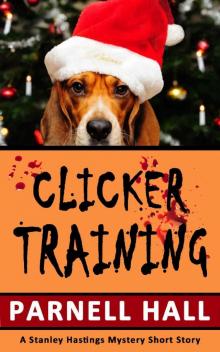 Clicker Training
Clicker Training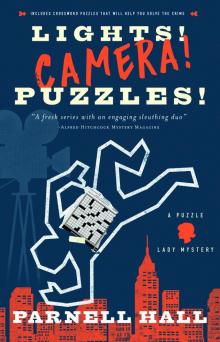 Lights! Camera! Puzzles!
Lights! Camera! Puzzles!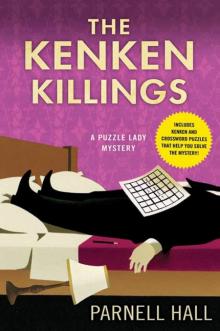 The KenKen Killings
The KenKen Killings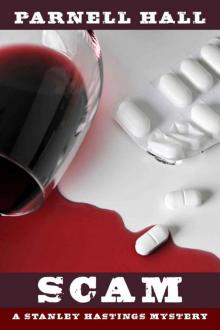 12-Scam
12-Scam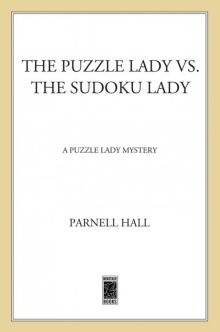 The Puzzle Lady vs. the Sudoku Lady
The Puzzle Lady vs. the Sudoku Lady 2 Murder
2 Murder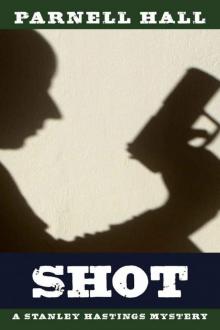 7 Shot
7 Shot You Have the Right to Remain Puzzled
You Have the Right to Remain Puzzled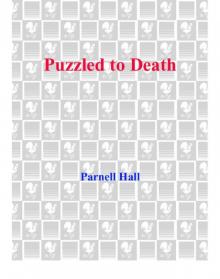 Puzzled to Death
Puzzled to Death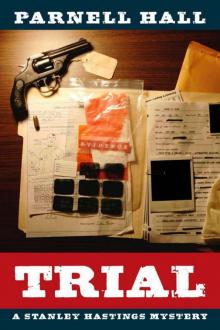 11-Trial
11-Trial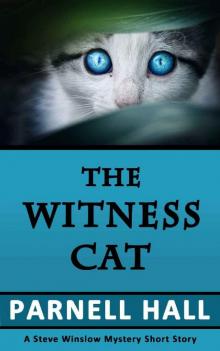 The Witness Cat (Steve Winslow Mystery)
The Witness Cat (Steve Winslow Mystery)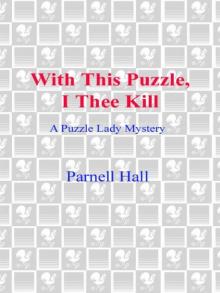 With This Puzzle, I Thee Kill
With This Puzzle, I Thee Kill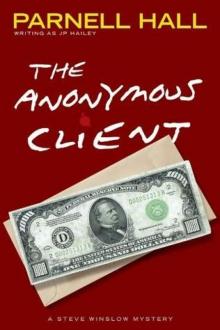 The Anonymous Client sw-2
The Anonymous Client sw-2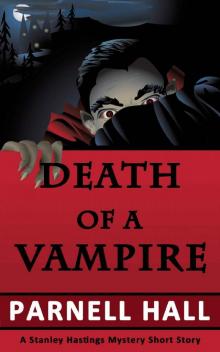 Death of a Vampire (Stanley Hastings Mystery, A Short Story)
Death of a Vampire (Stanley Hastings Mystery, A Short Story) The Wrong Gun sw-5
The Wrong Gun sw-5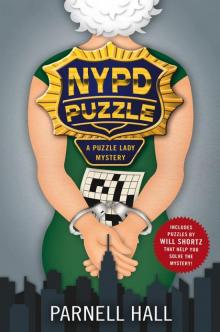 NYPD Puzzle
NYPD Puzzle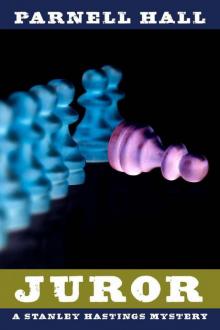 6 Juror
6 Juror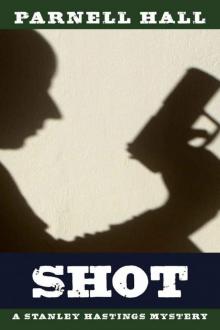 07-Shot
07-Shot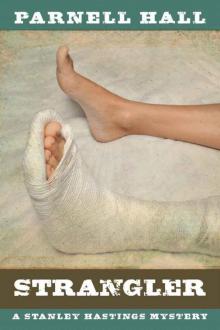 04-Strangler
04-Strangler 02-Murder
02-Murder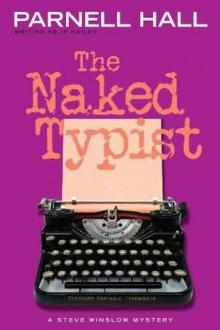 SW04 - The Naked Typist
SW04 - The Naked Typist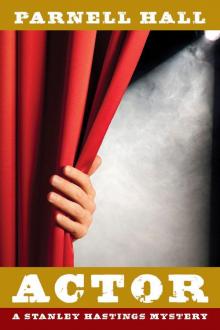 Actor
Actor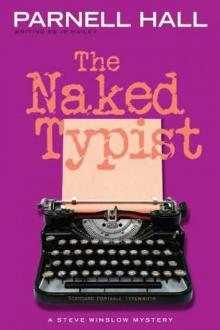 The Naked Typist sw-4
The Naked Typist sw-4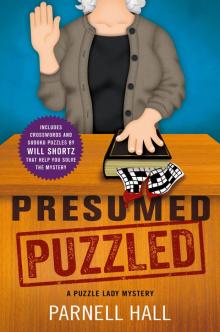 Presumed Puzzled
Presumed Puzzled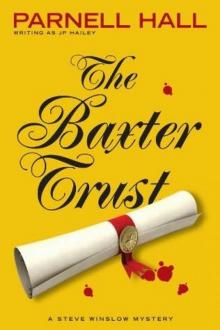 SW01 - The Baxter Trust
SW01 - The Baxter Trust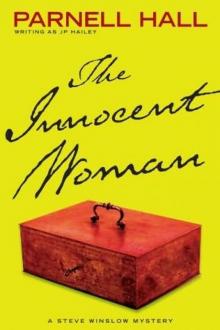 SW06 - The Innocent Woman
SW06 - The Innocent Woman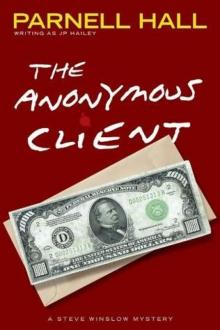 SW02 - The Anonymous Client
SW02 - The Anonymous Client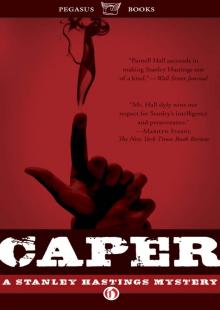 Caper
Caper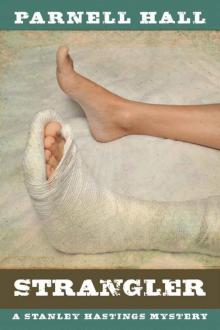 4 Strangler
4 Strangler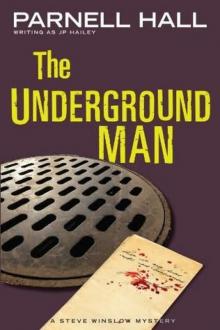 The Underground Man sw-3
The Underground Man sw-3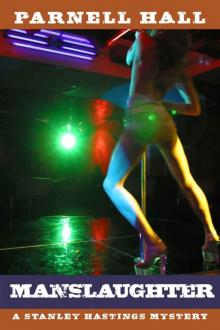 Manslaughter (Stanley Hastings Mystery, #15)
Manslaughter (Stanley Hastings Mystery, #15)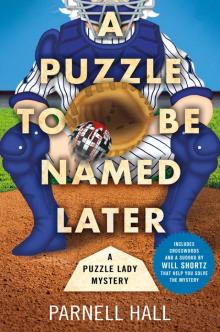 A Puzzle to Be Named Later--A Puzzle Lady Mystery
A Puzzle to Be Named Later--A Puzzle Lady Mystery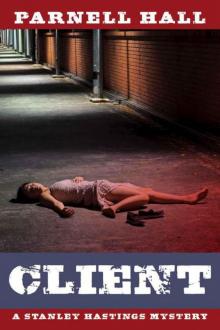 05-Client
05-Client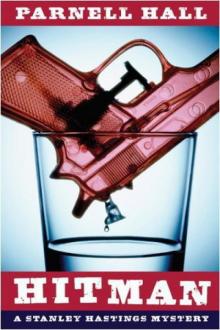 16 Hitman
16 Hitman SW05 - The Wrong Gun
SW05 - The Wrong Gun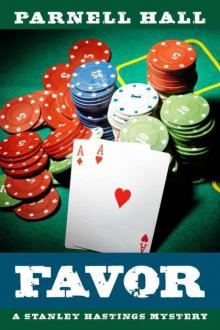 3 Favor
3 Favor Last Puzzle & Testament
Last Puzzle & Testament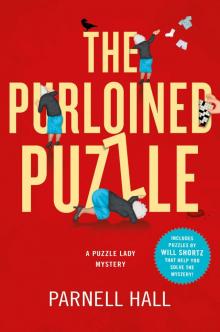 The Purloined Puzzle
The Purloined Puzzle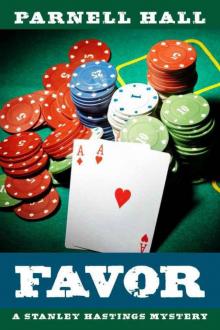 03-Favor
03-Favor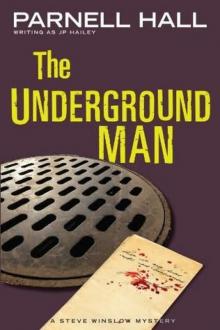 SW03 -The Underground Man
SW03 -The Underground Man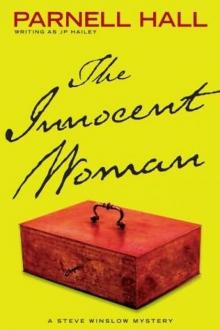 The Innocent Woman sw-6
The Innocent Woman sw-6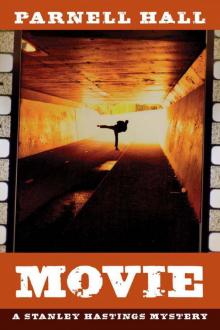 10 Movie
10 Movie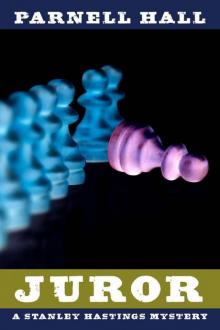 06-Juror
06-Juror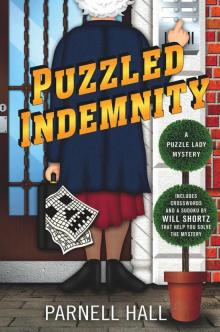 Puzzled Indemnity
Puzzled Indemnity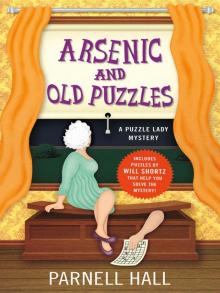 Arsenic and Old Puzzles
Arsenic and Old Puzzles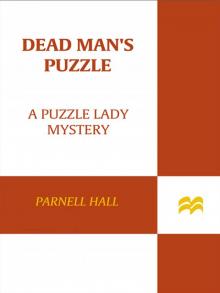 Dead Man's Puzzle
Dead Man's Puzzle Safari
Safari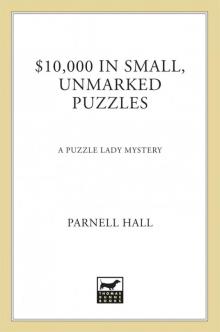 $10,000 in Small, Unmarked Puzzles
$10,000 in Small, Unmarked Puzzles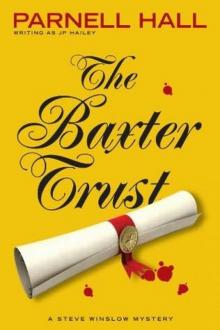 The Baxter Trust sw-1
The Baxter Trust sw-1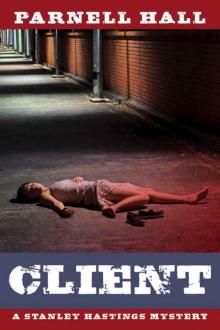 5 Client
5 Client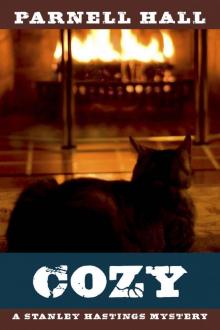 Cozy (Stanley Hastings Mystery, #14)
Cozy (Stanley Hastings Mystery, #14)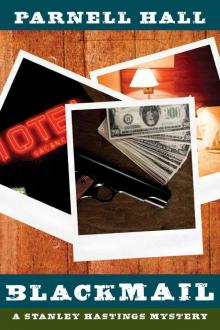 Blackmail
Blackmail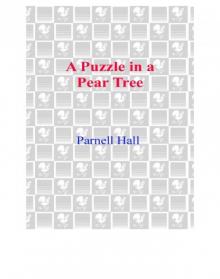 A Puzzle in a Pear Tree
A Puzzle in a Pear Tree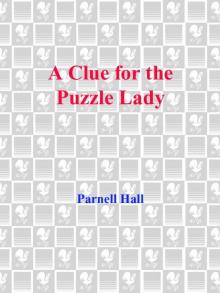 A Clue for the Puzzle Lady
A Clue for the Puzzle Lady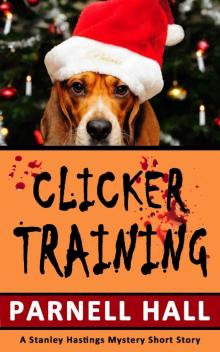 Clicker Training (Stanley Hastings Mystery, A Short Story)
Clicker Training (Stanley Hastings Mystery, A Short Story)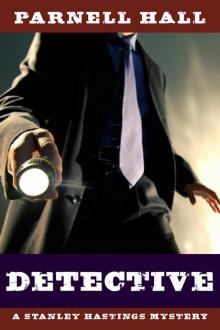 Detective (Stanley Hastings Mystery Book 1)
Detective (Stanley Hastings Mystery Book 1) 13 Suspense
13 Suspense